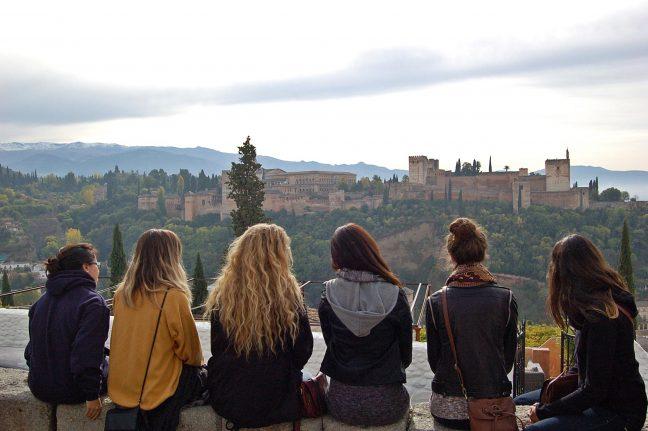I spent fall 2016 studying abroad in Seville, Spain. From across the ocean, I watched as President Donald Trump was elected. I listened to Spaniards quote satirical Simpsons episodes, making fun of Americans. I weathered all the American stereotypes thrown at me. Now I’m back, and being an American feels different than it ever has before. Here are some of my observations.
When you go to a restaurant in Spain, the duration of your meal will be absurdly long. The waiter will walk by your table without acknowledging you, your food will be prepared slowly and you won’t receive your check unless you seek out your waiter to ask for it.
At the beginning of my semester, this annoyed me. I was angry the servers didn’t value my time or my opinion of them. I tapped my foot through dinners, hangry and frustrated.
About a month into the semester, I started to think of myself as more worldly, more understanding. I knew servers in Spain don’t receive tips — they work for minimum wage and don’t generally receive gratuity based on their service. I figured slow service was the reality of the economic situation — servers had no monetary incentive to move quickly and efficiently, so they didn’t.
Toward the end of the semester, I had adjusted to the realities of Spanish restaurants. I entered with the knowledge my meal would take at least an hour and half. I learned to focus on the conversation and my friends rather than on the food. If I needed something, I sought out the server for help. I ate slowly, drank and enjoyed myself.
Now, back in the U.S., I’m confused by our restaurants here. Servers stop by the table every five minutes, taking your order, checking if you’re okay, asking if you like the food, offering up dessert, begging for your approval and your tip. As soon as you take your last bite, the server sweeps in to remove your plates and bring your check. American restaurants run on efficiency and large portion sizes.
In Spain, mealtime is a slow, drawn-out affair and food is really just the backdrop for the real purpose of the time — fostering your relationships.
In the U.S. mealtime has become another responsibility to juggle, a time to squeeze in more productivity. Here, students will eat an apple on the way to class or study while they stuff themselves with Easy Mac. If they go out to a restaurant, they wait impatiently to place their order, then wait impatiently for their food to arrive, then leave as soon as they finish. Mealtime in the U.S. either occurs around our more important responsibilities or concentrates solely on the food. Eating is rushed and quick — efficient.
Americans seem to prize speed. We are the country that invented fast food, that gets coffee to go because we don’t have the time to sit and drink it. We like to walk fast, to get things done quickly, to cram in as much as possible into our days. Everyone is busy, rushing off someplace.
In Seville, I interacted with time differently. The thin, winding streets necessitated long travel times anytime I left my apartment. My perception of distance was warped after a few months here. Anywhere was within walking distance in my mind. I learned to expect a walk as part of life. Not only were the meals, the classes and social interactions slower, but the commute to them added additional time. Everything took forever, but it no longer felt that way. Time just became this slow-moving thing. It was less important to me.
Time slipped away, but I felt that was what time was supposed to do. It was okay to waste away the days. It was okay to arrive late. It was okay if work took longer than it should. Or if I stayed out with friends later than I meant to. Or if the waiter took 15 minutes to bring back the check. The time slipped away from me, and I didn’t mind.
It made me wonder at why I clung on so tightly to time before. I didn’t accomplish much more when I was counting the minutes and tapping my foot while waiting for my coffee. I wasn’t happier when I ran off as soon as the bill came. Life didn’t run significantly smoother because the professor showed up to class on time.
The American view of time — fast-paced, budgeted out—isn’t better than the Spanish one. Life, like a good cappuccino, isn’t meant to be enjoyed while rushing off to the next thing.


